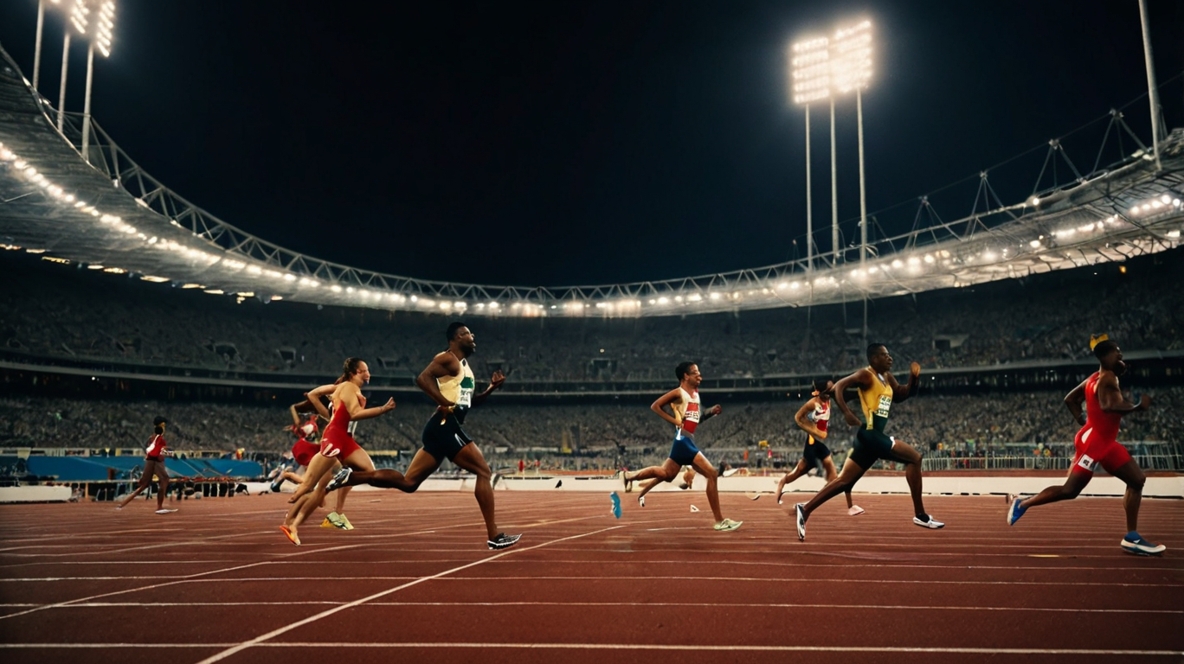Introduction
The heart of Olympic athletics lies on the track. From the explosive 100-meter sprint to the grueling 10,000-meter run, Olympic track events capture the drama, speed, and endurance of the world’s greatest athletes. Whether it’s Usain Bolt breaking records or marathon runners crossing the finish line with sheer determination, track events are some of the most watched competitions in Olympic history.
This article covers the different types of track events, their rules, famous champions, and the latest updates from Paris 2024.
Categories of Olympic Track Events
Olympic track races are divided into three main groups:
- Sprints (100m, 200m, 400m) – Short distances demanding maximum speed.
- Middle-Distance (800m, 1500m, 3000m steeplechase) – A mix of speed and endurance.
- Long-Distance (5000m, 10,000m, marathon) – Testing stamina and strategy.
- Relays (4x100m, 4x400m, Mixed 4x400m) – Team events where baton passing is crucial.
- Hurdles (100m hurdles women, 110m hurdles men, 400m hurdles) – Races with barriers requiring speed and rhythm.
- Race Walks (20km, 35km) – Long-distance walking events with strict technique rules.
Sprint Events
- 100 meters: Known as the “fastest race in the world.” Olympic champions here are often called the World’s Fastest Humans.
- 200 meters: A mix of speed and curve-running strategy.
- 400 meters: Considered one of the toughest sprints, testing both speed and endurance.
Famous Sprinters: Usain Bolt (Jamaica), Florence Griffith-Joyner (USA), Carl Lewis (USA), Elaine Thompson-Herah (Jamaica).
Middle-Distance Events
- 800 meters: Two laps around the track. Strategy and pacing are crucial.
- 1500 meters: Nicknamed the “metric mile.”
- 3000m steeplechase: Runners jump over barriers and water pits.
Famous Athletes: Hicham El Guerrouj (Morocco), David Rudisha (Kenya).
Long-Distance Events
- 5000m & 10,000m: Require endurance and tactical racing.
- Marathon (42.195 km): The most iconic long-distance race, traditionally ending the Olympic athletics program.
Legends: Eliud Kipchoge (Kenya), Kenenisa Bekele (Ethiopia), Tirunesh Dibaba (Ethiopia).
Relays
- 4x100m relay: Four sprinters pass the baton across 100m sections.
- 4x400m relay: Four athletes run one lap each.
- Mixed 4x400m: Introduced recently for men and women teams.
Relays are thrilling because of baton exchanges—one mistake can cost medals.
Hurdle Events
- 100m hurdles (women)
- 110m hurdles (men)
- 400m hurdles (both men and women)
Hurdlers need speed, timing, and rhythm to clear barriers without losing momentum.
Race Walks
Unlike running, one foot must always stay in contact with the ground. Judges monitor technique closely.
- 20km race walk
- 35km race walk
Track Events at Paris 2024
Paris 2024 brought unforgettable performances:
- 100m Men’s Champion: Fred Kerley (USA) defended his dominance.
- 100m Women’s Champion: Shelly-Ann Fraser-Pryce (Jamaica) added to her legendary career.
- Marathon: Eliud Kipchoge (Kenya) made history with another Olympic gold.
- 400m hurdles: Karsten Warholm (Norway) and Sydney McLaughlin-Levrone (USA) stunned with record-breaking runs.
World Records in Olympic Track Events
- 100m Men: Usain Bolt – 9.58s (2009)
- 100m Women: Florence Griffith-Joyner – 10.49s (1988)
- 400m hurdles Men: Karsten Warholm – 45.94s (2021)
- 400m hurdles Women: Sydney McLaughlin-Levrone – 50.68s (2022)
Why Track Events Are Special
- Pure test of speed, strength, and endurance.
- Showcase global diversity – athletes from every continent compete.
- Some of the most iconic Olympic moments (Bolt’s records, Kipchoge’s marathons).
- Inspire millions worldwide to take up running.
Conclusion
Olympic track events remain the crown jewel of athletics. From the explosive 100m sprint to the grueling marathon, they capture the spirit of competition and push human limits. With new stars rising at Paris 2024 and eyes already on Los Angeles 2028, the legacy of Olympic track events continues to inspire athletes and fans around the world.










